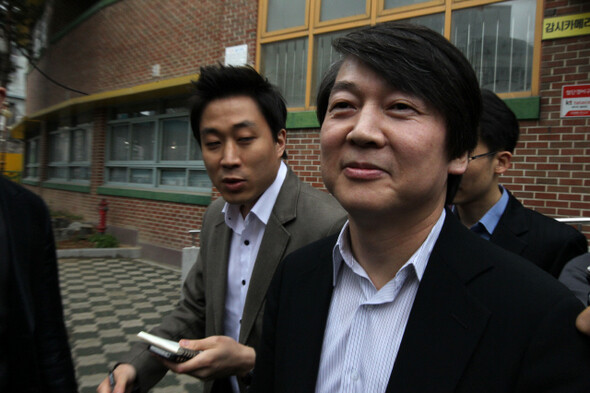hankyoreh
Links to other country sites 다른 나라 사이트 링크
Ahn Chul-soo looming as a political wildcard

By Kim Bo-hyup, staff writer
Ahn Chul-soo has offered no official opinion on Wednesday’s general election. A source close to Ahn says he probably regrets the result.
“There is a reason for every decision the public makes and it has always made important choices of its own,” said lawyer Gang In-cheol, a close associate of Ahn, while stressing that this was his own personal view. “I believe this is the outcome of the public examining the performance of the current administration [Lee Myung-bak and the New Frontier Party] and the possibility of [the opposition] as an alternative holder of power. It seems politicians will have to do a good job of interpreting the public sentiment contained in the election result.”
When it was asked if among opposition supporters would like Ahn to take a more active role in the election, Gang responded, “Isn’t it a bit strange to hold to account a person who neither took part in nor interfered with the general election?”
It is true that Ahn did not take part in the election. But can it be said that he interfered with it in no way whatsoever? Ahn gave lectures at universities in late March and early April, at which he encouraged young people to vote. In a YouTube video two days before the election, he urged people to vote and the people of Busan to make a wise choice. This bore the character of candidates‘ “Ahn Cheol-soo marketing,” but Ahn did endorse Democratic Party candidates In Jae-geun and Song Ho-chang. Both candidates won in their constituencies by margins of at least 10 percent.
Though Ahn did not endorse them, most of those assumed to be “good candidates” in places such as Gwangju, Daegu and Busan, lost in the election. The turnout, at 54.3%, was higher than the 46.1% registered at the 2008 general election, but lower than the 54.5% at the 2010 local elections. Some politicians take this to mean that Ahn’s ability to influence politics from the outside has reached its limit.
In an April 3 lecture at Seoul National University, Ahn said, “It’s too early to talk about the presidential election. If the current people do a good job for us, there will be no reason for me to run.” For Wednesday’s general election, the Democratic United Party and the Unified Progressive Party fielded single candidates in all parts of the country except the Honam region in order to strengthen its position against the NFP. Nonetheless, they were unable to stop the NFP from winning a parliamentary majority.
Some politicians judge that this election result has revealed that the power of Park Geun-hye cannot be matched by the current opposition, and that the floor is now open to Ahn.
On the topic of his political line, Ahn has made two different statements: “I am opposed to more concentration of political power in the hands of the ruling party.” And “If I take part in politics, I will not rely on any particular ideology.”
The first statement was made after the opposition had chosen its general election candidates and campaigning was beginning. The second statement was made last September, when Ahn was considering running in the Seoul mayoral by-election. The two statements suggest a non-partisan approach to politics.
For the moment, it seems unlikely that Ahn will apply force to one side or the other. “Ahn does not consider the advantages and disadvantages offered by the political terrain, or situation-based logic,” said Gang. “He has no confirmed external appointments other than his everyday duties.”
Please direct questions or comments to [english@hani.co.kr]
Editorial・opinion
![[Column] Has Korea, too, crossed the Rubicon on China? [Column] Has Korea, too, crossed the Rubicon on China?](https://flexible.img.hani.co.kr/flexible/normal/500/300/imgdb/original/2024/0419/9317135153409185.jpg) [Column] Has Korea, too, crossed the Rubicon on China?
[Column] Has Korea, too, crossed the Rubicon on China?![[Correspondent’s column] In Japan’s alliance with US, echoes of its past alliances with UK [Correspondent’s column] In Japan’s alliance with US, echoes of its past alliances with UK](https://flexible.img.hani.co.kr/flexible/normal/500/300/imgdb/original/2024/0419/2317135166563519.jpg) [Correspondent’s column] In Japan’s alliance with US, echoes of its past alliances with UK
[Correspondent’s column] In Japan’s alliance with US, echoes of its past alliances with UK- [Editorial] Does Yoon think the Korean public is wrong?
- [Editorial] As it bolsters its alliance with US, Japan must be accountable for past
- [Guest essay] Amending the Constitution is Yoon’s key to leaving office in public’s good graces
- [Editorial] 10 years on, lessons of Sewol tragedy must never be forgotten
- [Column] A death blow to Korea’s prosecutor politics
- [Correspondent’s column] The US and the end of Japanese pacifism
- [Guest essay] How Korea turned its trainee doctors into monsters
- [Guest essay] As someone who helped forge Seoul-Moscow ties, their status today troubles me
Most viewed articles
- 1[Column] The clock is ticking for Korea’s first lady
- 2Samsung barricades office as unionized workers strike for better conditions
- 3After 2 months of delayed, denied medical care, Koreans worry worst may be yet to come
- 4[Column] Has Korea, too, crossed the Rubicon on China?
- 5All eyes on Xiaomi after it pulls off EV that Apple couldn’t
- 6[Correspondent’s column] In Japan’s alliance with US, echoes of its past alliances with UK
- 7US overtakes China as Korea’s top export market, prompting trade sanction jitters
- 8Hong Se-hwa, voice for tolerance whose memoir of exile touched a chord, dies at 76
- 9[Editorial] When the choice is kids or career, Korea will never overcome birth rate woes
- 10[Photo] Smile ambassador, you’re on camera